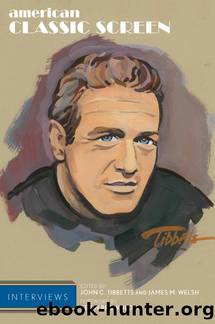American Classic Screen Interviews by Tibbetts John C.;Welsh James M.;Brownlow Kevin;Brownlow Kevin;

Author:Tibbetts, John C.;Welsh, James M.;Brownlow, Kevin;Brownlow, Kevin; [Tibbetts]
Language: eng
Format: epub
Publisher: Scarecrow Press, Incorporated
Published: 2010-08-15T00:00:00+00:00
Hollywood Royalty
Conversations with Henry KingâRemembering a Distinguished
Directing Career in Hollywood Spanning Forty-Seven Years
Rev. Gene Phillips, S.J.
Originally appeared in vol. 5, no. 5 (September/October 1981)
Henry King now lives in a splendid home in North Hollywood that was once owned by Amelia Earhart and her husband, George Putnam. It is decorated with souvenirs of a distinguished directorial career that stretched from 1915 to 1962, during which time he made nearly one hundred feature films. Among his memorabilia are several awardsâincluding the prestigious D.W. Griffith Award which the Directors Guild of America conferred upon King in 1956 (it has been given out only thirteen times since its inception); a prize for his direction of Tolâable David (1921) called the Photoplay Gold Medal (an awards competition which ante-dated the Oscars); and an Artistry in Cinema Award presented him by the National Film Society in 1979. He has also received two Academy Award nominationsâfor The Song of Bernadette (1943) and Wilson (1944). His other memorable films include Alexanderâs Ragtime Band (1938), Twelve OâClock High (1949), and Love Is a Many-Splendored Thing (1955). Gregory Peck, who gave his finest performances in King films, has said that the director has never received the praise he deserves for his consistently solid work. King was the most important director at Fox during his long tenure there of more than thirty years and was Zanuckâs first choice for most of the studioâs top projects. His films have won a wide audience over the yearsâone that few other directors can match.
He was born on a plantation in Christiansburg, Virginia, on January 24, 1888 (his birth date has been erroneously listed elsewhere as 1892 and 1896); and to this day he speaks with the mellow accents of a Southern gentleman. Now a nonagenarian, King is still a tall, commanding figure; at the same time, he is gracious and good-humored in discussing his work. Listening to him reminisce, one is in touch with a genuine pioneer of the movie industry who has had a lasting influence on the development of the movie medium as an art form. For the record, Kingâs extensive remarks about his two Hemingway adaptations, The Snows of Kilimanjaro (1952) and The Sun Also Rises (1957) may be found in my Hemingway and Film (Ungar, 1980); and are not repeated here in the interest of covering all of the other films we discussed during our three lengthy conversations, 1979â81.
Henry King: I joined the Empire Stock Company when I was only seventeen, and we toured all through the South. I continued acting in repertory on the road for a few years, and also began dabbling in directing during this period by sometimes rehearsing with the other actors in the afternoons to get more life into a show. When the producer of a play in which I was appearing heard of this, he came to New Orleans where we were playing at the time to fire me. After seeing a performance, however, he came backstage and congratulated me for improving the production.
After one tour I went to New York for a visit and had dinner one night with Pearl White and her husband.
Download
This site does not store any files on its server. We only index and link to content provided by other sites. Please contact the content providers to delete copyright contents if any and email us, we'll remove relevant links or contents immediately.
Still Foolin’ ’Em by Billy Crystal(36349)
Spell It Out by David Crystal(36110)
The Great Music City by Andrea Baker(31916)
Professional Troublemaker by Luvvie Ajayi Jones(29650)
Trainspotting by Irvine Welsh(21638)
Call Me by Your Name by André Aciman(20491)
The Secret History by Donna Tartt(19048)
We're Going to Need More Wine by Gabrielle Union(19034)
Cat's cradle by Kurt Vonnegut(15334)
Ready Player One by Cline Ernest(14639)
Molly's Game by Molly Bloom(14132)
Bombshells: Glamour Girls of a Lifetime by Sullivan Steve(14052)
The Goal (Off-Campus #4) by Elle Kennedy(13657)
Leonardo da Vinci by Walter Isaacson(13315)
4 3 2 1: A Novel by Paul Auster(12372)
The Social Justice Warrior Handbook by Lisa De Pasquale(12187)
The Break by Marian Keyes(9358)
Crazy Rich Asians by Kevin Kwan(9277)
The remains of the day by Kazuo Ishiguro(8969)
